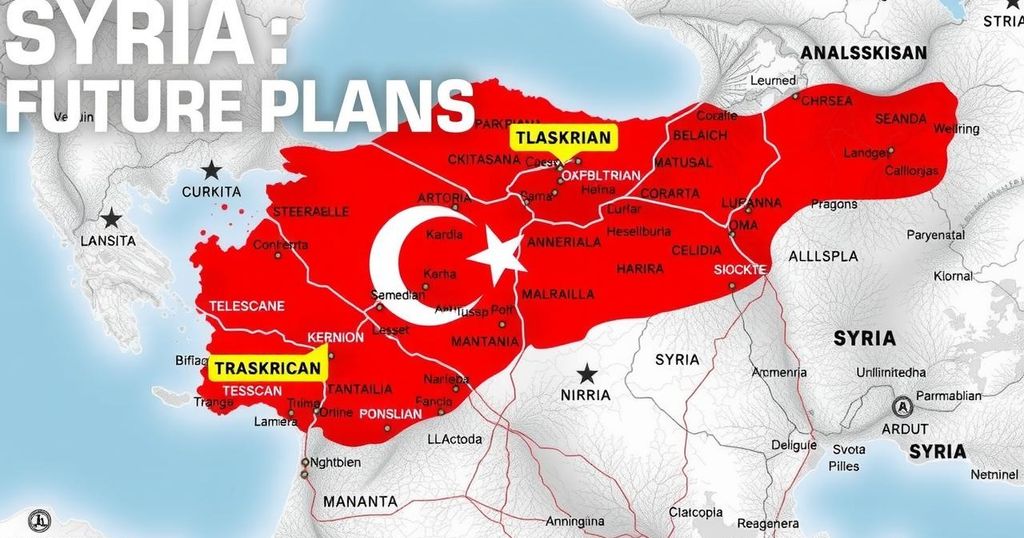Turkey has rapidly increased its influence in Syria following the surprising and swift collapse of Bashar al-Assad’s government. The military operation initiated against the Assad regime, particularly with the capture of Aleppo, positions Turkey as a central player in the region. Turkish officials emphasize the need for reconstruction, refugee returns, and resource management in the evolving Syrian landscape, guided by a desire to establish a broadly representative transitional government.
The swift collapse of Bashar al-Assad’s government took Ankara by surprise, although Turkish officials had long anticipated his eventual downfall. The Syrian military’s resistance had weakened, and Turkish officials had envisioned a limited operation involving Syrian opposition groups to alleviate the pressure on civilians from ongoing attacks by the regime in Idlib. This escalated unexpectedly with the capture of Aleppo, positioning Turkey as the dominant force in the region amidst a geopolitical context heavily influenced by Russian and American preoccupations.
Turkey’s strategy appears to focus on initiating dialogue between the Syrian government and opposition, advocating for the preservation of Syria’s institutional framework. The leader of Hay’at Tahrir al-Sham, Ahmed al-Sharaa, has adopted a conciliatory stance towards various societal groups, including minorities. Khaled Khoja, a former leader of the Syrian opposition, has praised the coordinated Turkish efforts in shaping this operation, suggesting that Turkey’s consistent support has been crucial for Syrian rebel initiatives.
President Recep Tayyip Erdogan previously signaled imminent improvements in security along Turkey’s southern borders. The Turkish government is also aiming to reconcile differences among various armed groups within the opposition while working towards establishing a transitional government that encompasses all political factions. Turkish officials have developed a governance model in northern Syria, which could serve as a blueprint during the post-Assad phase.
In addition to institutional considerations, control over resources remains a pressing issue, particularly those in the eastern regions governed by US-backed SDF forces. Observers speculate about a potential negotiation between HTS and the SDF for resource access. Furthermore, the Turkish government is aware of the need to facilitate the return of millions of Syrian refugees, many of whom originate from areas like Aleppo.
Turkey expects a gradual return of these refugees, contingent on improved security and socio-economic conditions. The extensive rebuilding of Syria’s infrastructure and housing post-conflict is anticipated to require significant investment, likely to be coordinated by Ankara alongside financial support from the Organisation of Islamic Cooperation and Gulf states.
The implications of the Syrian conflict and its evolving dynamics are particularly significant for Turkey, which has been a vocal supporter of the opposition forces against the Assad regime. Ankara’s involvement has been shaped by both humanitarian concerns and national security interests, particularly regarding the influx of Syrian refugees. With sudden shifts on the ground, including the quick capture of Aleppo by armed opposition, Turkey finds itself in a strategically advantageous yet complex position. This dynamic requires adept diplomatic maneuvering and a clear vision for governance and resource management in post-Assad Syria, presenting both opportunities and challenges for Turkish foreign policy.
Turkey’s recent military and diplomatic maneuvers in Syria have elevated its influence during a pivotal transition. As it seeks to balance the re-establishment of Syrian governance and the security of its borders, Turkey’s approach will necessitate collaboration with various factions, particularly HTS and the SDF. The future of Syria hinges on the reconstruction of infrastructural integrity and the return of Syrian refugees, both of which will require substantial coordination and investment from Turkey and its allies. Overall, Turkey aims to secure a leading role in shaping Syria’s future, ensuring its national security and regional stability.
Original Source: www.middleeasteye.net







